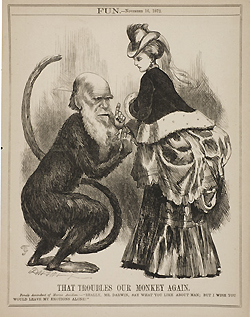Darwin’s Champions
Reactions to the Origin

“That Troubles Our Monkey Again,” Fun, new series 16: 203, November 16, 1872
Reaction to Darwin’s book was swift and strong, ranging from great enthusiasm to bitter condemnation. By its very nature, his claim that new species emerged through the action of natural forces alone, challenged the mixture of religion and science that then underlay natural history. And the book emerged into a politically and culturally charged world. In the decades before 1859, a series of “materialist” works had alarmed respectable opinion. Vestiges of the Natural History of Creation, by Robert Chambers (1802-1871) but published anonymously in 1844—to huge sales—had proposed a self-developing cosmos. The “materialist manifesto” of 1847, promulgated by the young, brilliant physiologists Hermann von Helmholtz (1821-1894), Émile DuBois-Raymond (1818-1896), and others, denied a special life-force and asserted that all organic functions were reducible to chemistry and physics. Another manifesto, The Communist Manifesto of 1848, from Karl Marx (1818-1883) and Friedrich Engels (1820-1895), had asserted a materialist basis for the social world, and came out during widespread social unrest. And in more narrowly religious realms, the work of German theologian David Strauss (1808-1874), The Life of Jesus, translated into English in 1846, naturalized the Bible from a book of miraculous events to a book of religious myth, and moreover a book most likely of human origin. The transcendent world seemed under attack, perhaps fatally so.
The Darwinian moment intersected this mix in March 1860. Seven English theologians published Essays and Reviews, maintaining that God worked through constituting regular laws, not by overturning the course of nature through miracles. One of them, the Savilian Professor of Geometry at Oxford, the Rev. Baden Powell (1796-1860), saw Darwin’s Origin as central to this position. In his essay, he stated:
Mr. Darwin’s masterly volume on The Origin of Species by the law of ‘natural selection’ . . . must soon bring about an entire revolution of opinion in favour of the grand principle of the self-evolving powers of nature.
Last Reviewed: May 8, 2014


